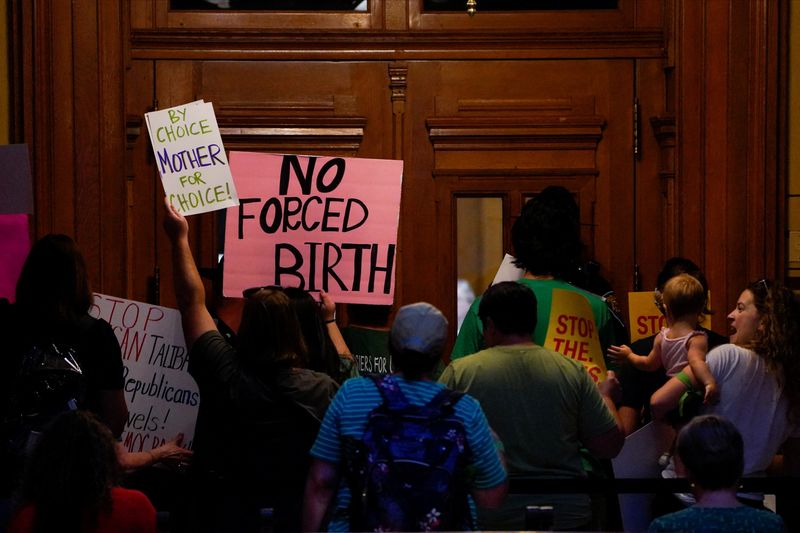Planned Parenthood, others urge Indiana judge to block abortion ban
2022.09.19 16:25
[ad_1]

© Reuters. FILE PHOTO: Abortion rights demonstrators protest outside the House chambers in the Indiana Statehouse during a special session to debate banning abortion in Indianapolis, Indiana, U.S. August 2, 2022. REUTERS/Cheney Orr/File Photo
By Brendan Pierson
(Reuters) – A Planned Parenthood affiliate and other abortion rights groups and providers on Monday urged an Indiana judge to block the state’s ban on most abortions, which took effect last Thursday.
Kenneth Falk, a lawyer with the American Civil Liberties Union of Indiana, told Judge Kelsey Hanlon in Indianapolis that the ban ran afoul of privacy and liberty rights Falk said were guaranteed by the state’s constitution. The ACLU sued to challenge the law alongside Planned Parenthood Great Northwest, Hawai’i, Alaska, Indiana, Kentucky and others.
“The most devastating harm here…is the loss of personal autonomy,” Falk said. He argued the ban puts Indiana residents’ health at risk and that Hanlon should put it on hold while she considers the case.
Indiana’s law prohibits all abortions after conception, with limited exceptions for rape, incest, lethal fetal abnormalities or a serious health risk to the mother.
Indiana Solicitor General Thomas Fisher said the state constitution did not mention privacy and that abortion was already a crime when it was ratified in 1851, remaining so until the U.S. Supreme Court’s landmark 1973 Roe v. Wade ruling recognized a right to abortion nationwide.
“That history forecloses any legitimate claim to a right to have an abortion under the Indiana constitution,” he said. Fisher argued the state legislature had a legitimate interest in protecting fetal life.
Hanlon, a Republican, did not rule at the hearing.
Indiana was the first state to pass a new law banning abortion after the U.S. Supreme Court overturned Roe in June, though other states quickly began enforcing older bans, drawing a raft of legal challenges now working their way through state courts.
About half of states, led by Republicans, have moved to restrict abortion in the wake of the Supreme Court’s decision, or are expected to do so.
[ad_2]
Source link








